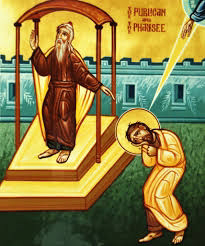You see the difference
very clearly.
The Pharisee
parades his deeds.
The Publican
admits his need
for forgiveness.
The Pharisee
is humbled
by the justification
of the Publican.
But what does this mean?
What does it mean
to be justified?
[PAUSE]
Too often
we think of things
in terms of Law:
guilt and innocence,
convicted and acquitted,
condemned and redeemed.
The trouble is,
with human justice,
it doesn't go very far.
If a man kills a little girl,
he goes to gaol,
but the consequences
of that act continue.
The law cannot free that man
from his crime.
Even if the girl's parents
forgive him
that death will always
be with him.
This is true,
even of St Paul
who, as Saul,
is complicit in
the murder of St Stephen
and the persecution
of the first Christians.
Yet, we are all very ready
to put St Paul's sins aside
in favour of recognising
his life's work
building up the Church
spreading the Gospel
and giving up his freedom
and his life
for the love of God.
But all this
does not change the fact
that St Stephen is dead
and the persecution has happened.
[PAUSE]
This is where we
begin to see what
"justified by faith" means.
If justification were
just God banging a gavel
and saying to St Paul
or to the man who killed
the little girl,
"I declare you innocent!"
we know something would be wrong.
Even if the killer
were honestly,
completely
and utterly sorry,
for God to say,
"you are now innocent"
seems a gross affront
to the girl
and those who nourn her.
And if God says,
"I declare that my Son
is guilty and not you"
is even worse.
For then God
punishes the innocent
for the sake of the guilty
even if the innocent
is God Himself.
To think of justification
only in terms
of law, crime, punishment
and acquittal
renders it empty
of any power
to deal with evil.
There is something more.
[PAUSE]
All a judge can do,
is say, "you're innocent."
With God,
things are different.
God can say,
"Let there be light!"
and there is light.
God can say,
"Be thou clean!"
and you are clean.
God's words
create things,
restore things,
make things real
give things substance.
God's words
can make a person innocent.
Don't ask how
because we can't
see that happening
except in glimpses.
We catch a glimpse
with St Paul
because,
somehow,
we can set aside St Paul's
persecution of the Church
in the light of his conversion.
Somehow,
beyond our understanding
and limitation
of human justice,
St Paul is made right
and those he harmed
are in glory with God
in exquisite joy,
missing nothing
filled with grace
and love.
What God gives
to justify a human being
is Himself,
for if to justify something
makes that thing good,
then God must be present
because God is what it means
to be good.
It is the presence of God
that heals the wounds of sin
because sin is separation
from God.
St Paul's faith
is the first point
of his justification
and through his works
he continues to grow
in justification
because he brings more
people to God.
Justification is about
growing a greater awareness
of God's goodness
in our lives
and bringing Him
into the injustices in the world.
[PAUSE]
The Pharisee
justifies himself
and keeps God out of the situation.
The Publican
acknowledges
the need for God
and invites Him in
by pleading for mercy.
He knows he has a need
for God.
And so God provides
the Publican
with righteousness
in order to live
a better life.
St James says that
we cannot have faith
without doing good works.
We need to work
at our faith
by exercising our choice
to do good things
and avoid sin.
To do good things is
how we repent
by turning away from the bad.
We see the Publican
begin his journey
of repentance anew
and receiving the healing
of his life that he needs
in order to grow closer
to God.
This is our faith, too,
and, by recognising the need
for God's healing
and asking for His mercy
we shall be made right with Him
and all the evil we do
will be undone by Him
for the salvation of all who love Him.



No comments:
Post a Comment